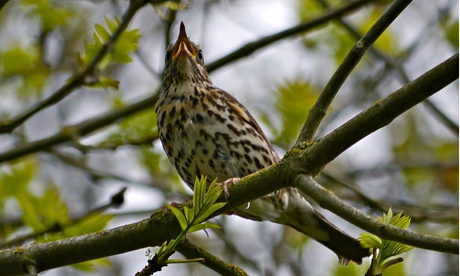
As if at the flick of a switch bird song fills the lane. So loud and powerful is it that I am disoriented, my senses blurred to everything else. Lambs running in gangs across the field, buzzards soaring through the sky, a breeze spitting rain: everything goes out of focus.
I look up and a few feet above my head, perching in a young ash tree, a song thrush, (known also as a throstle or mavis) is turning itself into sound.
In the 17th century, the naturalist Robert Lovell divided birds into the “melodious” and “not melodious”. And, a 100 years later, the naturalist and clergyman William Bingley devised an assessment table, giving birds points for “melodiousness of tone”, “sprightliness”, “plaintiveness”, “compassion” and “execution”.
This thrush would score a hefty nine, although many of Bingley’s contemporaries would complain that, like blackbirds, thrushes were a bit rustic and coarse. By the mid 19th century another naturalist, Philip Henry Gosse, was praising the “melodious chaunt of this charming bird” and the way its superior variety, power and fullness of notes created as much individual difference as those between individual human voices.
Thomas Hardy’s “darkling thrush” became the ominous voice to end that century and its romanticism. In more recent times bird song has been described in scientific terms of territorial possession and sexual dominance. Scientists now say the learned melodies of bird song carry one of these meanings and conclude that the expression layer in human language – that involving the changeable organisation of sentences - has evolved from the same antecedents.
Listening to the song thrush transcend his own body, which almost disappears in a blur of speckled brown, it seems he is bursting with soul, filling this place with the sound of his entire being. Interpretations of what he’s doing seem inadequate. The thrush gathers the nature of song to himself and transforms this place by reaching something I can hear with a daring more essential to him than life itself.
Paul Evans @DrPaulEvans1

